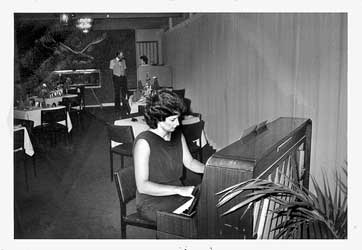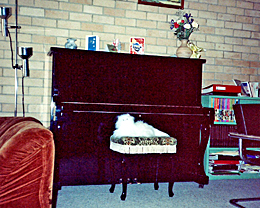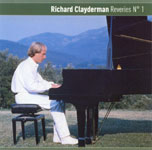
Piano was my first love. For as long as I can remember I wanted to play and I begged and cajoled my mother into letting me learn. Finally when I turned six she surprised me, taking me to lessons with a local teacher. And so began my love affair with music and particularly the piano. Over the next 14 years I took lessons, practiced often for four or more hours a day and sat exams until, at age 20, I had passed Grade Seven.
But unknown to me, during a severe bout of measles when I was around 9 years old, a time bomb had been planted in my ears. It was first diagnosed during a routine school examination when I was 16, but at this early stage there was no noticeable difference to my life and I did not believe I had a problem. I left school, started work and continued on to college where I studied Applied Arts teaching with piano performance as part of my curriculum. Music was a big part of my life.
I had also enjoyed singing in church groups and choirs and it was a natural step to join the college choir. It was late in my first year at college when I was asked to leave the choir because I could not always keep pitch, that my hearing loss first impacted on my life. At the time I felt disgraced not yet realizing it was my encroaching deafness which had caused the problem. It was also around this time that tinnitus became my constant companion and I visited many specialists around the country in an attempt to cure these other worldly sounds. I felt frightened and I feared total deafness. The specialists gave me no hope and suggested I learn lip reading initially predicting I would lose all hearing by the time I was 20.
But being young I still could not imagine it and continued to learn the piano, teaching from home and then in country schools, always dreaming of how I would study for that extra exam to complete my A.Mus.A, one of the highest performance grades in Australia.
But the time bomb ticked and by the time I was 29 (1980) I had completely lost hearing in my left ear with my right ear working at only 50%. I still worked in the music industry, demonstrating and selling pianos and organs, playing in shopping centres and concerts as well as teaching. My large repertoire came in handy when I played easy listening dinner music in restaurants and hotels. I was able to play well known pieces by composers such as Beethoven, Chopin, Tchaikovsky and Handel plus the composers of 'modern' and 'popular' music from the 1920's through to the 1970's.

During my time in the music industry I fell in love with a special piano and when I won 'Rookie of the Year' in 1981 my prize was this beautiful piano. It really was a special instrument. Not only did it look great but it had a wonderful sound and was rewarding to play. I vowed to keep it for life. I played for hours each day always thinking about achieving that A.Mus.A.
But the time bomb ticked on. I lost the tinkly sounds of the high pitches first, hearing only the clicking of the hammer hitting the string. Without the help of a hearing aid I could not hear the sound of me playing at all and with a hearing aid it was unclear, the noise building up like in an echo chamber. Slowly I gave up teaching and little by little I stopped playing as all sound gradually died. I was now profoundly deaf and even with the help of a hearing aid I could no longer understand the tv or radio. I could not go to meetings or movies and parties were hell. I was heavily reliant upon lip reading for conversation and was becoming more and more isolated.
As a single parent rearing three children finances often became difficult and when in 1992 (age 40), partly because of my deafness, I lost my job I made the heart rending decision to sell my beloved piano. It seemed my dream had become my nightmare.
I have no recollection of how I discovered cochlear implants but in 1997 I started seeking information and was assessed for suitability. During this time I also met my second husband Rob, and after waiting almost five years and with his support, I underwent the operation and switch on process in my left ear during Christmas 2002-2003. I was now 52 years old and had been deaf for many years.
Switch on is far from a magic moment. Just like when you rise in the morning your eyes take a while to adjust to the light, my left ear, which had died 25-30 years earlier, needed to be introduced to sound slowly. However, within a few minutes I was understanding speech without the help of lip reading and within a few days I was talking on the phone and listening to the radio. It should be noted that not every implantee has this kind of success and certainly not so quickly, but because I had, and knowing my interest in music, my audiologist suggested I try music appreciation. This is not generally an expected outcome for implantees so it was really exciting. For me music is like a second language and I hoped my brain would remember the sounds and make sense of them. My audiologist suggested I buy a CD of my favourite music and play it over and over and over again to see if this would stimulate my hearing memory.

I had missed two decades of music. I did not know any of the modern bands or singers but I went looking and eventually found a Richard Clayderman CD of pieces I had played in my entertaining days. I took it home, put it into the DVD player (I did not own a CD player of course) and lay down on the lounge to listen. I held the list of tracks, trying to match the name of the track and the memory of that tune to the sound I was hearing. But it was as if all instruments of the orchestra were given a different song, in a different key and then put in a barrel to play all at the same time. It certainly sounded like nothing I remembered. Feeling disappointed I told Rob I could not identify anything and could not tell even which track in the list was playing. So he sat with me. He did not know every track but at least he could tell me where they started and point out their names from the numbered the list.
But then things became confused. Suddenly he said, "these tracks are out of kilter. Something is wrong." Finally, he identified that a track title was missing from the list on the CD sleeve. So here I was with my new hearing using the CD list as a jog to help awaken my musical memory, but instead I held a faulty list. I was trying to hear Moonlight Sonata when Moon River was playing and Barcarolle when it was really Bridge Over Troubled Water. No wonder it made no sense
After identifying the tracks correctly and finding where the missing track was on the list, Rob created a new list leaving a space for the unknown missing track. I listened once more. At least this time I was on target and my brain was trying to match the right name to the sound I was hearing. But to no avail - it was still just noise and I felt disheartened because it seemed music was beyond me. (Remember this was only the second time I had tried and I was doing remarkably well for just a few weeks after the implant, but I am an impatient person and expect results immediately!)
A few days later Rob was out and I had a report for my BA degree to complete, so I decided to play my Richard Clayderman CD in the background (for my third listening attempt). Of course background for me is still pretty loud and especially so since the DVD player was in the lounge and I was in my office next door. I put it on and started working on the computer. About 3 or 4 tracks into the CD I suddenly realized I was recognizing every track and could name them despite not having the list in front of me. Can you imagine my surprise and joy! Then a new track started and I knew immediately what it was. I had just identified the missing track from the CD list. I jumped up and danced around the lounge, tears pouring down my face. I could hardly wait for Rob to get home so I could share my joy. It was at this stage, just a few weeks after my implant, that I realized I would be able to enjoy playing the piano again.
Rob bought me that piano a few weeks later - a replacement for the one I had so heart-rendingly sold 11 years earlier, equally as beautiful and equally as loved.
It is now two and a half years since my implant and I have enjoyed many hours of playing. A surprising outcome is that the very high notes are prettier than I recall. I no longer hear the sound of the hammer hitting the string, but the sweet sound of the strings vibrating. The bass notes have a wonderful resonance and the sound of the lowest C stirs my heart. My fingers are not as agile and I prefer simpler softer music rather than that which is very loud or has complex harmonies and multiple chords. I have greater difficulty learning music I do not already know, but since I had a huge repertoire I have plenty of music to enjoy at my finger tips. I am practising eighth grade pieces - many of which I actually learned during my years of study, and who knows - maybe one day I will realize that dream of passing the A.Mus.A.
In February 2010 Felicity had her second bi-lateral implant. Read about her second implant experience
Felicity is the deafness editor for Bella Online ~ the Voice of women. An index of Felicity's Bella Online Articles (upto #292) can be found here
Felicitys's Articles
- 2015: Sep Sunday Mail (Adelaide) Article Sunday mail page photo or pdf transcipt
- 2015: Oct Beats of Cochlea article Pg 11BHA National Spotlight: Ed 7 Oct 2015 - page 10
- 2015: Oct Better Hearing Australia Pg 3 Adelaide Newsletter Pg 3 (pdf)
- 2023: Feb University of Iowa Health Care:
- Emotional and Social Losses that Accompany Loss of Music Enjoyment:
- Information for People with Hearing Loss
- Information for Audiologists
- Musicians with Cochlear Implants (CIs):
- Singing or Playing Instruments While Using Cochlear Implants:
- Singing or Playing Instruments While Using Cochlear Implants: Information for Audiologists
